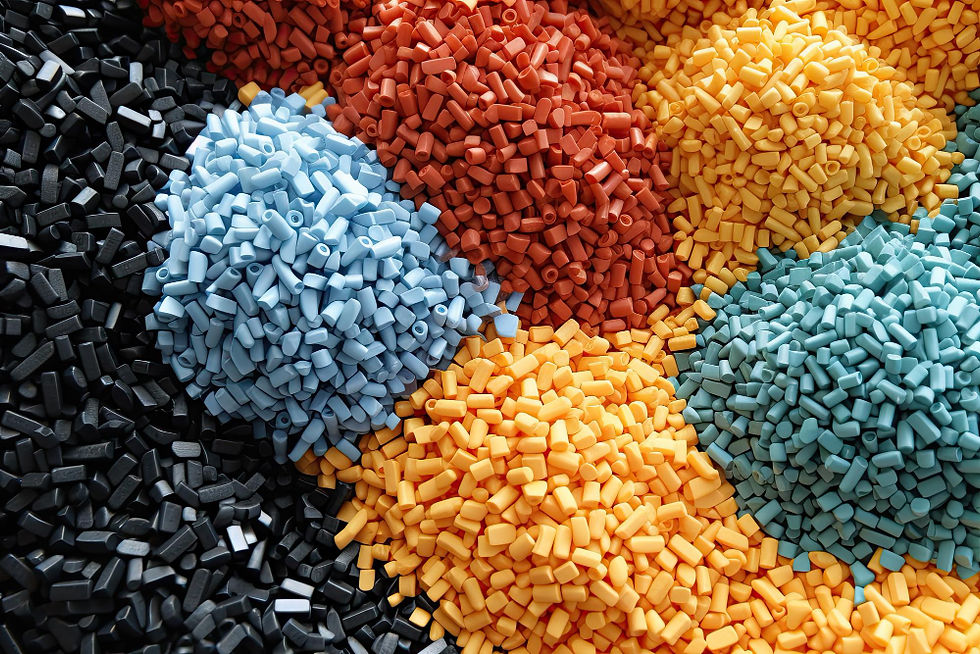Shaping a Sustainable Future: Revolutionising the Plastics Industry
- Jul 28, 2023
- 3 min read

The plastics industry has undeniably played a significant role in modern life, revolutionising various sectors and providing countless conveniences. However, its widespread use and improper disposal have led to severe environmental consequences, such as plastic pollution and greenhouse gas emissions. To secure a more sustainable future, the plastics industry must undergo a transformative shift towards environmentally-friendly practices. In this blog, we explore how the plastics industry can adopt more sustainable approaches, reduce its ecological footprint and promote a circular economy.
1. Embrace Bioplastics and Bio-Based Materials
One of the key steps toward sustainability in the plastics industry is the adoption of bioplastics and bio-based materials. We have touched on this in our blog Innovative Materials in the Plastic Sector. Unlike conventional plastics derived from fossil fuels, bioplastics are made from renewable sources such as corn starch, sugarcane, or algae. These materials have the potential to reduce greenhouse gas emissions and dependence on finite resources.

2. Implement Efficient Recycling Technologies
Improving and expanding recycling technologies is crucial in reducing plastic waste. Currently, a significant portion of plastic products ends up in landfills or pollutes the oceans. By investing in advanced recycling methods like chemical recycling and adopting standardised recycling symbols for easier sorting, the plastics industry can ensure that more plastic waste is effectively repurposed.
3. Shift to a Circular Economy Model
A circular economy model prioritises recycling and reusing materials to minimise waste generation. Plastics manufacturers can collaborate with other industries to create closed-loop systems, where used plastics are collected, processed, and reintroduced into the production chain. This approach promotes resource efficiency and decreases the environmental impact of the sector.
4. Reduce Single-Use Plastic Production
Single-use plastics, like straws, bags, and utensils, contribute significantly to plastic pollution. The industry can work towards reducing the production of such items by promoting reusable alternatives and encouraging consumer behaviour changes. Additionally, governments and businesses can collaborate to implement plastic bans or levies to discourage the use of unnecessary single-use plastics.

5. Invest in Research and Innovation
Sustainable practices require continuous research and innovation. The plastics industry can invest in developing new materials with enhanced biodegradability, exploring novel production methods, and designing products for easier recycling. Funding research in this area will foster technological breakthroughs that can drive sustainability in the industry.
6. Advocate for Extended Producer Responsibility (EPR)
Extended Producer Responsibility (EPR) is a policy approach that holds manufacturers responsible for the entire lifecycle of their products, including post-consumer disposal. By embracing EPR, plastics manufacturers will be incentivised to design products with recyclability in mind, encouraging more sustainable practices throughout the supply chain.
7. Educate Consumers on Sustainable Choices
Raising awareness among consumers about the environmental impact of plastics and promoting sustainable alternatives is crucial. The industry can collaborate with environmental organisations, schools, and governments to educate the public about recycling, responsible consumption, and the importance of reducing plastic waste.
The plastics industry has a significant role to play in building a sustainable future. By embracing and implementing, some, if not all of the points above, the industry can move towards a more sustainable and environmentally-friendly path. It is imperative that stakeholders work together to address the challenges and opportunities that lie ahead, ensuring a cleaner and healthier planet for generations to come.
At Amey Plastics, we take our environmental responsibilities incredibly seriously. To discuss how we can help ensure your products and manufacturing processes are as sustainable as possible, contact the team on 01730 266525 or email sales@ameyplasticsltd.co.uk.




Comments